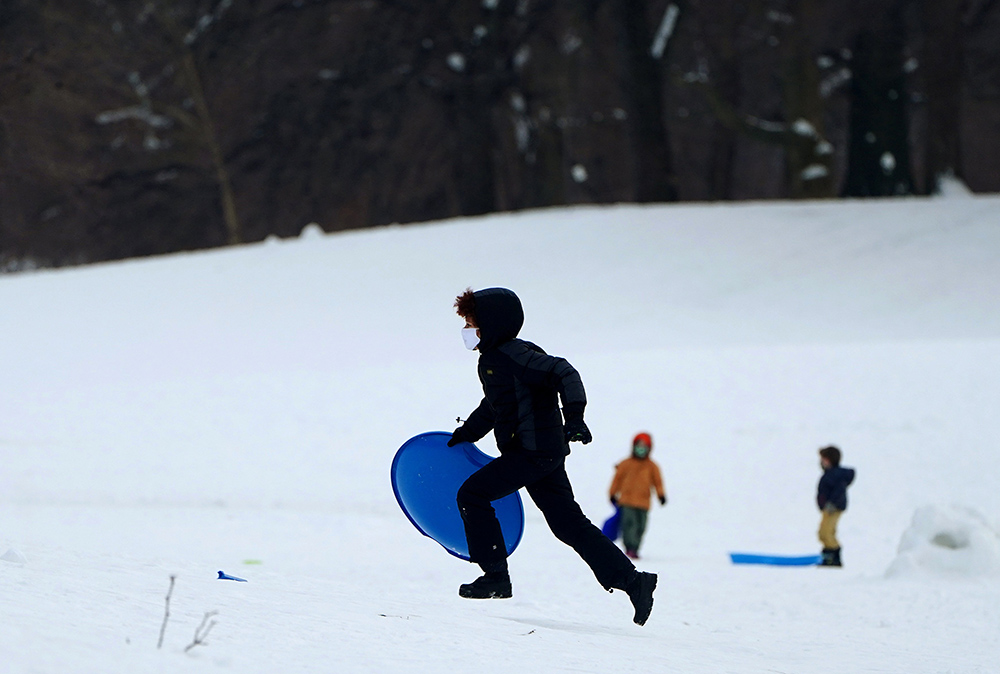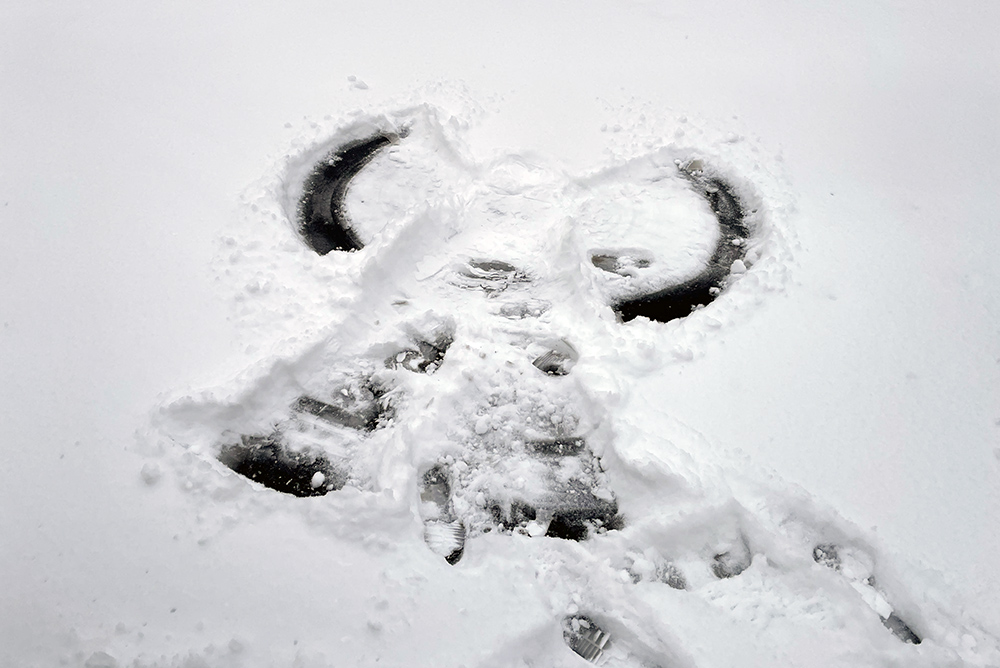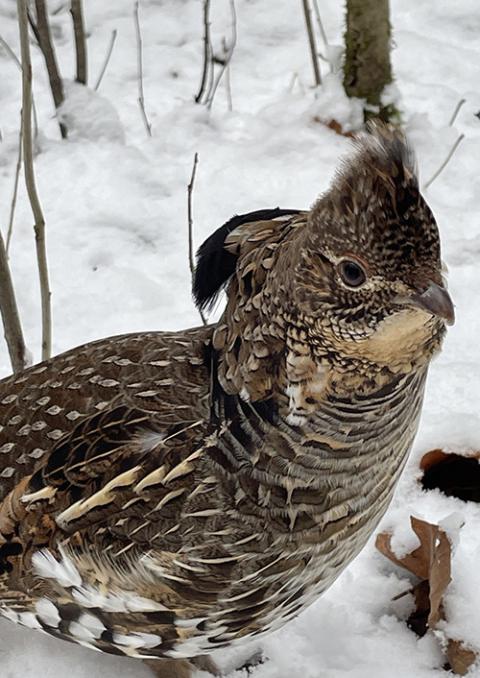
Children in the Brooklyn borough of New York City play in the snow Feb. 10, 2021. (CNS/Reuters/Carlo Allegri)
This winter, my son played in the snow for the first time. He's 3; before the winter storm that swept through the Northeast in mid-January, depositing almost 5 inches total on our area of Southeastern Pennsylvania, he'd never experienced snow deep enough to play in.
That struck me because snow was such an essential part of my childhood. I lived in Connecticut until third grade and some of my earliest memories involve wading through knee- to waist-deep snow. When we moved to Pennsylvania, snowy days remained an expected and welcome part of every winter. The fact that my son had to wait three years to have one feels strange.
But if climate change continues unabated, I'm afraid that our winters will only get warmer. My fear isn't just that my kids won't have snow days, but what we'll all lose if the natural cycle of the seasons is broken.
Snow days were one of the greatest joys of childhood. Only Christmas morning could compare with the thrill of waking up to cool white light coming through the window shades and knowing that when I pulled them up I would see a world transformed: my orderly suburban neighborhood changed into a place both alien and brimming with possibility.

A snow angel made by John Dougherty and his son while playing in their yard on a snow day in January 2024 (John Dougherty)
The best snow days were spent almost entirely outside. I would spend hours playing and exploring, digging trenches and building snowmen, wandering to the far edge of the yard just for the satisfaction of looking back and seeing my footprints carving across that empty white.
Snow days invited me to immerse myself in nature and the rhythms of winter. I familiarized myself with the different consistencies of snow: what was good for packing into snowballs and snowmen heads, what would just land as fine powder, what was slippery and treacherous to walk on.
In the backyard, I would trace animal and bird prints, or study how the different plants and trees around our house reacted to the snow and ice.
These days, when there are driveways to shovel and cars to clean and offices to get to, I understand why my parents saw snow as a nuisance. But for me, the magic didn't fade as I got older.
Instead, I learned to appreciate the unique peacefulness of snow days: the particular way snow muffles sound, as if you've somehow stepped into a world a little distant from the chaos of everyday life. I love watching the sunset over snow, casting purple and pink shadows along the soft white hills. I love standing outside at night as the snow comes down in perfect silence, and knowing that the world is fundamentally good and beautiful, despite much evidence to the contrary.
But we have more to lose than snow days and happy winter moments. As snow becomes less frequent, we'll feel the ripple effects throughout our ecosystems. In some ways, we already are.
Advertisement
Warmer winters, for instance, mean less snow and more rain. This winter, heavy rainfall in my area led to power outages and dangerous flash floods. After one particularly brutal storm in early January, roads around our house were washed out for days.
The National Oceanic and Atmospheric Administration reported record-breaking water levels from three of its stations in the Philadelphia region following this storm. Its station in Philadelphia recorded the highest water levels since it was established in 1989, exceeding the record previously set during Hurricane Sandy in 2012. Maryland and Maine also saw historically high water levels during the same storm.
On the other hand, a wetter winter could mean a drier spring: scientists predict that a lack of snowmelt into the soil will lead to spring droughts, which could negatively affect crop growth.
Local wildlife are also affected. Scientists believe that climate change is responsible for a marked decrease in the population of ruffed grouse — Pennsylvania's state bird — in recent years.
During the winter months, grouse typically bury themselves in snow tunnels to sleep and conserve energy, a process called "snow roosting." But as less snow falls, grouse are forced to roost in trees, exposing them to predators. They are also particularly susceptible to West Nile Virus, carried by the mosquitos that thrive in the warmer, wetter climate.
And then there's the economic impact as seasonal businesses adjust to this new reality. In 2020, some snowplow companies began negotiating seasonal contracts with large property owners who pay the same regardless of snowfall, a preemptive measure for winters that will need less and less of their services.
Meanwhile, ski companies and other businesses associated with winter tourism worry that warmer winters may dramatically alter the business model they've taken for granted for decades.
In the Pocono Mountains, winter tourism has a yearly economic impact of $4.2 billion. Already, resorts and tourism companies are building up their indoor options and investing in automated snowmaking to avoid losing their most profitable season.
In his recent apostolic exhortation Laudate Deum, Pope Francis writes: "What happens in one part of the world has repercussions on the entire planet. This allows me to reiterate two convictions that I repeat over and over again: 'Everything is connected' and 'No one is saved alone.' "
Snowfall varies from year to year, and warm winters have happened before. But it would be a mistake to only consider these things in isolation. Our seasons exist in an intricate cycle; disrupt one piece of it, and the entire system shudders.
So as I watched my son enjoy his first snow day, I felt both joy and a sense of urgency. I want him to have more days like that. That means remaining committed to mitigating climate change, and healing the damage already done to the fragile rhythms of our world. If not, happy memories of snow days will be all we'll have left.









